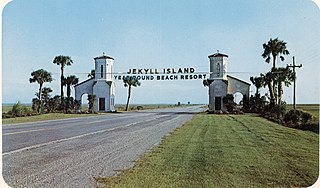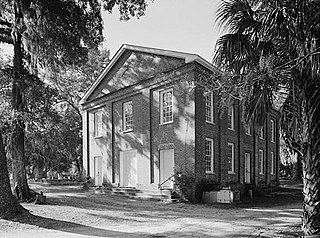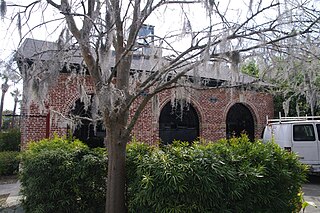
Charleston County is located in the U.S. state of South Carolina along the Atlantic coast. As of the 2020 census, the population was 408,235, making it the third-most populous county in South Carolina. Its county seat is Charleston. It is also the largest county in the state by total area, although Horry County has a larger land area. The county was created in 1800 by an act of the South Carolina State Legislature.

Hilton Head Island, often referred to as simply Hilton Head, is a Lowcountry resort town and barrier island in Beaufort County, South Carolina, United States. It is 20 miles (32 km) northeast of Savannah, Georgia, and 95 miles (153 km) southwest of Charleston. The year-round population was 37,661 at the 2020 census, although during the peak of summer vacation season the population can swell to 150,000. It is the principal city of the Hilton Head Island–Bluffton–Port Royal metropolitan area, which had an estimated population of 232,523 in 2023.

Kiawah is a sea island, or barrier island, on the Atlantic coast of the United States. Located 25 miles (40 km) southwest of Charleston in Charleston County, South Carolina, it is primarily a private beach and golf resort. It is home to the Kiawah Island Golf Resort, with spacious villas, beaches, large and acclaimed golf courses, and other attractions. As of the 2010 census, Kiawah Island's population was 1,626, up from 1,163 at the 2000 census. The island is part of the Charleston-North Charleston, SC Metropolitan Statistical Area. Alternative spellings and variants of the name itself include "Kiawa", "Kittiwar", and "Kittiwah". Census Tract 21.04, located on the island, has a per capita income of $168,369, the highest in South Carolina.

Jekyll Island is located off the coast of the U.S. state of Georgia, in Glynn County. It is one of the Sea Islands and one of the Golden Isles of Georgia barrier islands. The island is owned by the State of Georgia and run by a self-sustaining, self-governing body.

Johns Island is an island in Charleston County, South Carolina, United States, and is the largest island in the state of South Carolina. Johns Island is bordered by the Wadmalaw, Seabrook, Kiawah, Edisto, Folly, and James islands; the Stono and Kiawah rivers separate Johns Island from its border islands. It is the fourth-largest island on the US east coast, surpassed only by Long Island, Mount Desert Island and Martha's Vineyard. Johns Island is 84 square miles (220 km2) in area, with a population of 21,500.

Boone Hall Plantation is a historic district located in Mount Pleasant, Charleston County, South Carolina, United States and listed on the National Register of Historic Places. The plantation is one of America's oldest plantations still in operation, as it has continually produced agricultural crops for over 320 years. The majority of this labor, as well as the construction of the buildings and its characteristic bricks, was performed by enslaved African Americans. For this reason, the site was named one of the African American Historic Places in South Carolina in 2009. The historic district includes a 1936 Colonial Revival-style dwelling, and multiple significant landscape features, including an allée of southern live oak trees, believed to have been planted in 1743. The site is open for public tours.

America's 11 Most Endangered Places or America's 11 Most Endangered Historic Places is a list of places in the United States that the National Trust for Historic Preservation considers the most endangered. It aims to inspire Americans to preserve examples of architectural and cultural heritage that could be "relegated to the dustbins of history" without intervention.

Lincolnville Historic District is a neighborhood in St. Augustine, Florida established by freedmen following the American Civil War and located on the southwest peninsula of the "nation's oldest city." It was designated as an historic district in 1991 and listed on the National Register of Historic Places. Originally recorded with 548 contributing buildings, the district is bounded by Cedar, Riberia, Cerro and Washington streets and DeSoto Place.

American Beach is a historic beach community in northeastern Florida once popular with African-American vacationers. It is located north of Jacksonville on Amelia Island in Nassau County. During the time of segregation and the Jim Crow era, African Americans were denied access to many public amenities such as public pools and beaches in order to increase the value of nearby real estate, among other reasons. In view of this Abraham Lincoln Lewis, Florida's first black millionaire and president of the Afro-American Life Insurance Company, founded American Beach as a resort community that was visited mostly by African Americans, though all were welcome. It contains the American Beach Historic District, a historic district which was listed on the National Register of Historic Places in 2002.

The Dock Street Theatre is a theater in the historic French Quarter neighborhood of downtown Charleston, South Carolina.

McLeod Plantation is a former slave plantation located on James Island, South Carolina, near the intersection of Folly and Maybank roads at Wappoo Creek, which flows into the Ashley River. The plantation is considered an important Gullah heritage site, preserved in recognition of its cultural and historical significance to African-American and European-American cultures.

The Penn Center, formerly the Penn School, is an African-American cultural and educational center in the Corners Community on Saint Helena Island. Founded in 1862 by Quaker and Unitarian missionaries from Pennsylvania, it was the first school founded in the Southern United States specifically for the education of African-Americans. It provided critical educational facilities to Gullah slaves freed after plantation owners fled the island, and continues to fulfill an educational mission. Leigh Richmond Miner photographed students and activities at the school.

In 1870, the Louisville and Nashville Railroad was constructed through the southernmost section of Harrison County, Mississippi, connecting New Orleans, Louisiana, and Mobile, Alabama. A northern transportation route into south Mississippi was provided by the Gulf and Ship Island Railroad at the turn of the 20th century. These railroads provided an inexpensive means for moving passengers as well as goods, and opened south Mississippi to both industrial and recreational development. Rapidly progressing lumber and seafood industries transformed the Mississippi Gulf Coast in the 1920s, and people arrived from throughout the United States to take advantage of the economic boom. Northern tourists were attracted to the Mississippi Gulf Coast because of mild winters and cool sea breezes in summer, before the introduction of air conditioning. Besides the weather, other tourist attractions included seafood restaurants, swimming, golf, schooner races, sailing to offshore islands, and recreational fishing. During this period of economic expansion, grand hotels were constructed along the Mississippi Gulf Coast to accommodate businessmen, tourists, and transient workers. Most of these grand hotels no longer exist; and of the two structures that were still standing after the first decade of the 21st century, neither served as a lodging establishment. Together, these grand hotels represented an important era in the history of the Mississippi Gulf Coast throughout the 20th century.

The Hutchinson House is the oldest identified house on Edisto Island, South Carolina associated with the black community after the American Civil War. It was the residence of Henry Hutchinson, a freedman who was a noteworthy post-war Sea Island Cotton planter.

The Seashore Farmers' Lodge No. 767 is an historic building in coastal South Carolina that was erected to house a fraternal lodge for African-Americans. The Lodge was built about 1915 by local black farmers. Their organization provided insurance, advice, and burial assistance to members, and the structure was the headquarters for the outfit. In 1953, a new pavilion opened at nearby Mosquito Beach, and the Lodge fell into disuse.

Bailey's Store is one of the last nineteenth century commercial structures on Edisto Island, Charleston County, South Carolina. Bailey's Store was likely built earlier than 1825 on Edingsville Beach, a popular seaside resort, before it was moved to its present location about 1870 following the abandonment of Edingsville Beach. Because all of the remaining structures at Edingsville Beach were swept into the Atlantic Ocean in the hurricane of 1893, Bailey's Store is the only survivor of that community. The building was moved in two parts to Store Creek. It was reassembled there for use as a gin house already on that location. The building was listed in the National Register November 28, 1986.

The Francis Marion Hotel is a historic hotel opened in 1924 and located at 387 King St., Charleston, South Carolina. It is one of the tallest buildings in Charleston. The hotel is a member of Historic Hotels of America.

The Reconstruction Era National Historical Park, formerly Reconstruction Era National Monument, is a United States National Historical Park in Beaufort County, South Carolina established by President Barack Obama in January 2017 to preserve and commemorate activities during the Reconstruction Era that followed the American Civil War. The monument was the first U.S. National Monument dedicated to the Reconstruction Era. The John D. Dingell, Jr. Conservation, Management, and Recreation Act, signed March 12, 2019, by President Donald Trump, re-designated it as a national historical park. It is administered by the National Park Service.

























